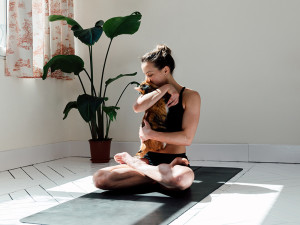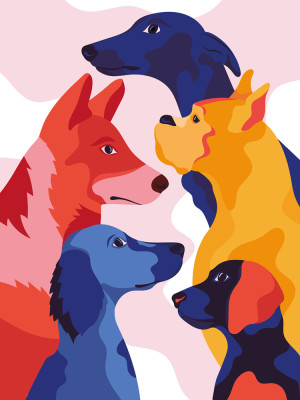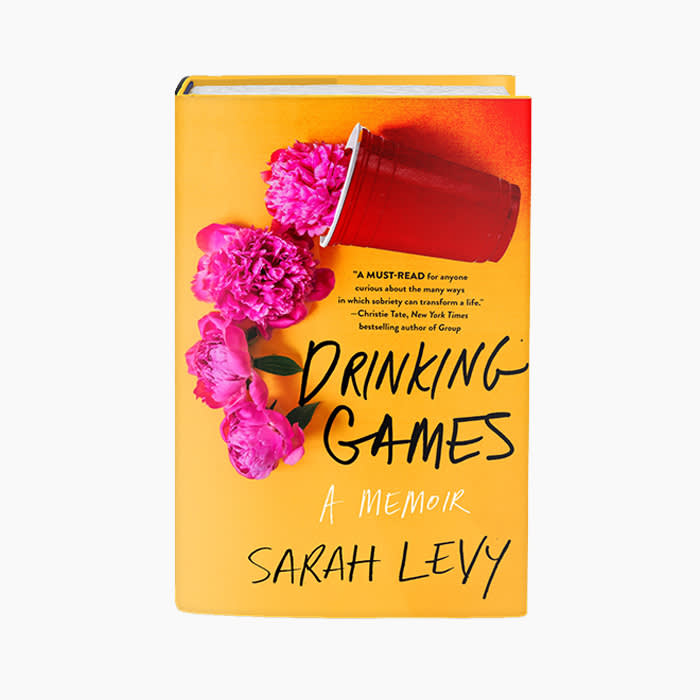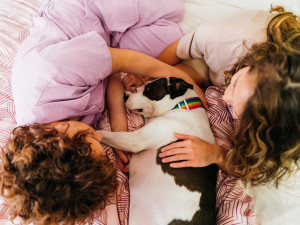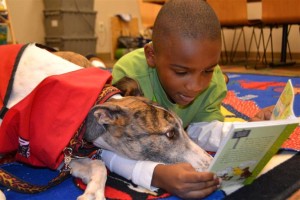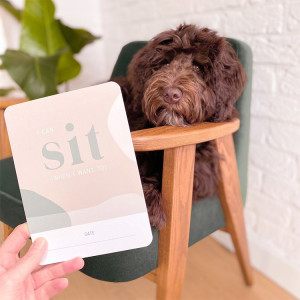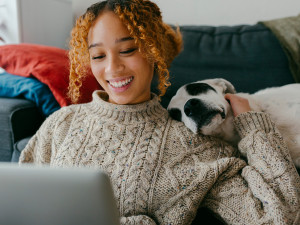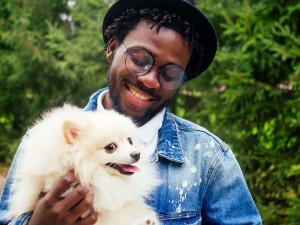How My Dog Helps Me Stay Sober
Brie reminds me that my sobriety is so much bigger than myself.
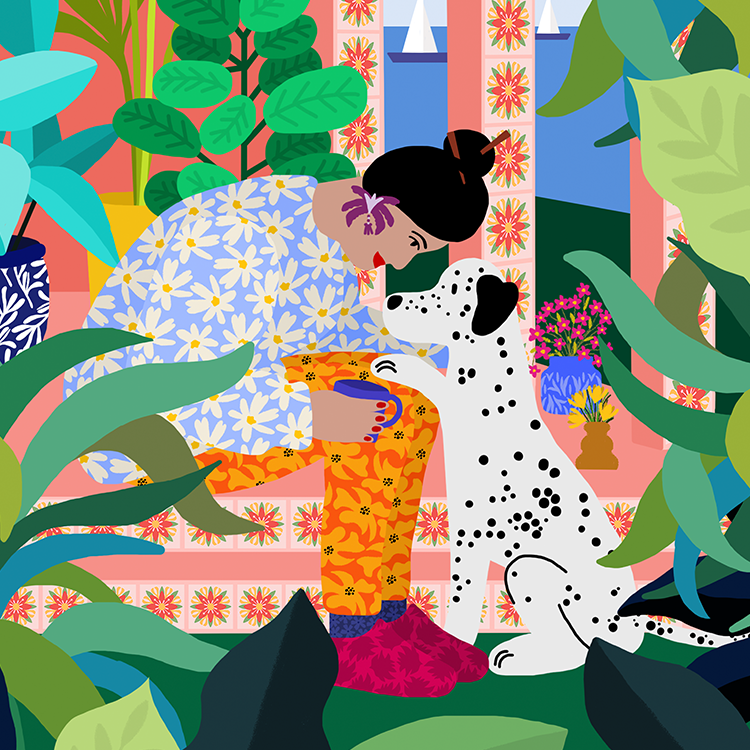
share article

Your pet wants you to read our newsletter. (Then give them a treat.)
In the days after my husband and I brought our dog, Brie, home, I wondered if we had made a mistake. For the record, I am madly in love with Brie, a Schnauzer / Poodle mix who likes to sprawl across my body and demand belly rubs while I read. But in our early weeks together, we experienced some growing pains.
Before Brie, I had spent the past three years focused solely on myself. After over a decade of vodka sodas, blackouts, and hangovers, I got sober at 28 and began the process of rebuilding my life without alcohol. At times, this was uncomfortable, like when I attended work happy hours at breweries or watched friends take tequila shots at birthday parties. But as I implemented new practices — recovery meetings, therapy, meditation, and exercise — my sobriety became a steadier force in my life.
I had the luxury of being selfish: In early sobriety, I was single, but I eventually married a supportive partner who encouraged me to prioritize my mental health and wellbeing. I put my sobriety before everything else, and it worked.
A Rough Start
As anyone who has ever had a puppy will tell you, it is an exercise in consistently caring for something (or someone) before yourself. I had grand plans for seamlessly integrating a dog into my routine; Brie would laze around the house while I worked, nap while I meditated, and join me for brisk hikesopens in a new tab.
Brie, naturally, had other ideas. She was all energy: She peed constantly, barkedopens in a new tab until we played with her, chased us in circles, cried in her crateopens in a new tab, and needed nonstop supervision as she ambled around our apartment inspecting our carpets and couches. Walking half a block with her took 30 minutes, as she painstakingly sniffed every square inch of her new world. My own self-care practices took a backseat, and although Brie was perhaps the cutest dog to have ever lived, I often became frustrated with her.
“I feel like I have puppy postpartum depression,” I joked to my friends, but it wasn’t really funny. It was shameful to admit, but I resented this five-pound dog who was suddenly demanding all of our attention and energy. I missed my quiet routine, my tidy apartment, and sleeping in.
My husband and I enlisted a traineropens in a new tab who helped us with basic commands and leash training. She suggested we spend at least 20 minutes a day practicing these commands with Brie to reinforce the work we did together in our sessions. Equipped with a pocketful of treatsopens in a new tab, I repeated the same daily cycle — sit, stay, come — and praised her when she listened. In these moments, I felt our bond strengthening. As I watched her brain latch onto the familiar words, I recognized that she was trying her best. We both were.
Grieving Together
When Brie had been with us for a few months, I lost my grandfather — my first experience with grief in sobriety — and Brie seemed to intuitively know exactly what I needed. Her brown orbs watched me as I cried, and she carefully curled up next to me, her sweet face inches from my own. The moment cracked something open in me. I had been putting so much pressure on Brie to fit perfectly into my old life. But I couldn’t control her any more than I could any other variable. Rather, I needed to make space for her, exactly as she was.
As Brie continued to grow, I was consistently reminded of my own path to progress in sobriety. When I first stopped drinking, I needed to develop new coping mechanisms and adjust old routines. There were challenging moments; recovery required patience, consistency, and, often, a sense of humor. Similarly, one day at a time, Brie continued to develop into her adult self. She stumbled at times — going on hunger strikesopens in a new tab when she tired of her food, having the occasional accidentopens in a new tab in the house — but eventually grew into a mellow, curious, gentle dog. Even better, she stopped waking us up at 6 a.m.
Recovering — Together
Two years later, Brie has become an integral part of my sobriety. I eventually became less rigid in the ways I thought about self-care, and we created a new routine together. She lays in my lap while I attend virtual recovery meetings, and I meditate while she runs around the dog parkopens in a new tab. Instead of my vigorous solo workouts, Brie and I take leisurely strolls around the neighborhood; she pauses to smell all the flowers, which reminds me to do the same. She even sleeps in with us on weekends, stretching languidly when we wake her. It’s surreal to remember a time when I resented her presence; now, when I have to go out of town, — or even just out to dinner — I miss her. (Evidently, the feeling is mutual: In a true display of pandemic-puppy-codependenceopens in a new tab, she cries whenever my husband and I leave the house. We’re working on it.)
Ultimately, I didn’t get sober for my days to revolve around myself. I gave up alcohol so I could show up for my loved ones and be a present participant in life in all its unpredictable turns. I may have lost sight of it along the way, but I’m forever grateful to my sweet Brie for reminding me.
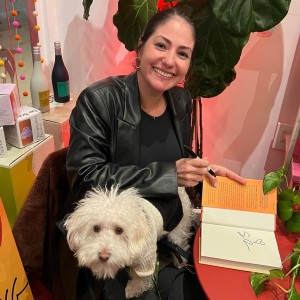
Sarah Levy
Sarah Levyopens in a new tab is the author of Drinking Gamesopens in a new tab, a memoir in essays. Her writing has appeared in The New York Times, The Cut, and Vogue, among other publications. She lives in Los Angeles with her husband and their dog, Brie.
Related articles
- opens in a new tab
Does Your Dog Have Therapy Dog Potential?
Renowned animal behaviorist Patricia McConnell, PhD, on what it takes to be a great therapy dog.
![illustration of multi-colored dogs]() opens in a new tab
opens in a new tabIs Your Dog Tricky to Train? Here’s Why You Shouldn’t Feel Guilty
It’s important to remember that dogs are individuals, so training isn’t one-size-fits-all.
![]() opens in a new tab
opens in a new tab5 Places Where Therapy Dogs Do Their Best Work
At airports, hospitals, schools, and more, therapy dogs make things better.
![]() opens in a new tab
opens in a new tabPawness’s Milestone Cards Will Mark Your Puppy’s Greatest Achievements
Just like your friends do with their infants on Instagram (ahem).
![A woman staring at her computer while holding her dog close.]() opens in a new tab
opens in a new tab10 Things to Consider Before Adopting a Pet
It’s a big decision, so check these boxes before you sign on the dotted line.
![Man hugging his fluffy white dog happily]() opens in a new tab
opens in a new tabChemistry Between People and Dogs Is Real (It’s Science)
How the “love hormone” oxytocin connects us with our pups.
